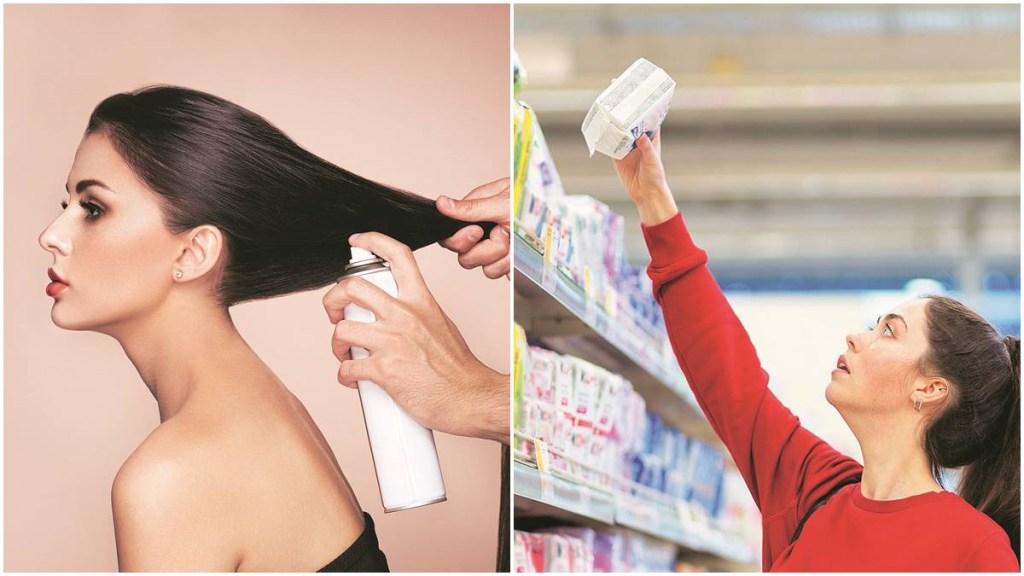In October this year, a report from an independent laboratory Valisure uncovered ground-breaking details that led to the near wiping off of the dry shampoo market. The report suggested that certain aerosol dry shampoos had the potential presence of benzene, a cancer-causing chemical. Top brands like Dove, Nexxus, Suave and TRESemme recalled their dry shampoos voluntarily.
According to the US Centers for Disease Control and Prevention, benzene is made from both natural and man-made processes. The former includes volcanoes and forest fires. It is also a part of crude oil, gasoline and cigarette smoke. In 2021, this had also led to the recalling of several deodorants and sunscreens as they contained the chemical.
Also Read: Are you a CEO dealing with work depression and anxiety? What is it and how to deal with it
Dr Arvind Badigar, technical director at drugmaker BDR Pharmaceuticals, explains a few cautionary measures to be taken while buying a product to ensure its safety. He says, “Looking for tamper-proof features like packaging and labelling is key while buying personal care products to check authenticity from the pharmaceutical stand point. Another deciding factor to ensure genuine product buying is through its barcode. Consistency of texture and smell of the product are also a deciding factor to ensure it reacts rightfully on the skin. It doesn’t matter how sure you are of product authenticity, it’s always recommended to test the contents on a small area of your skin before using it. Getting attracted to deals isn’t always a wise choice.”
Pharmaceutical giant Johnson and Johnson (J&J), too, has announced the discontinuation of its baby powder globally in 2023 after a series of lawsuits were filed against them for allegedly containing asbestos, a carcinogen. However, the brand denied the charges.
Also Read: Bharat Serums and Vaccines will acquire Firstline Pharma, Genomicks to enhance its presence in women’s health segment
Dr Rakesh Badhe, cancer surgeon, Criticare Asia Multispecialty Hospital & Research Centre, Mumbai, explains that there are three types of chemicals – procarcinogens, which cause cancer due to change in metabolism; co-carcinogens, which cause cancer by acting with other chemicals, and directly acting carcinogens. He adds that WHO classifies carcinogens into four groups – clear cut carcinogens for humans, carcinogens based on animal studies, carcinogens in certain situations and non-carcinogenic.
“This list keeps getting revised every now and then. Generally, a company cannot or will not print that they have carcinogenic substances in their product because nobody will buy them. Even if it is made mandatory by the FDA and the law, most of the time, it happens that companies sell products and retrospectively, recall them if they find certain chemicals which have been now labelled as carcinogens in the WHO list.” Not just products, he adds that processed meat, alcohol, tobacco and deep-fried products are clear-cut carcinogens. “Colouring substances which are used by the hotel industry like metallic yellow are clearly carcinogenic too. But these are not generally labelled everywhere. These are just sold over the counter and people buy it,” says Dr Badhe.
Not just consumer products but when a recent study pointed towards the presence of carcinogenic substances in sanitary pads in India, it became a bigger cause of concern. The study titled ‘Wrapped in Secrecy: Toxic Chemicals in Menstrual Products’, released by environmental NGO Toxics Link found the presence of toxic chemicals like phthalates and VOCs (volatile organic compounds) in most of the organic and inorganic sanitary pads that are sold in the Indian market.
As per the report, the contaminants found in sanitary pads can also cause cancer and release microplastic particles into the environment.
As per experts, phthalates are associated with health issues, including endocrine disruption, PCOS, effects on the heart and reproductive systems, diabetes, some cancers, and congenital disabilities.
Professor Dr Somashekhar SP, chairman – Medical Advisory Board, Aster DM Healthcare – GCC & India and global director – Aster International Institute of Oncology – GCC & India, lead consultant – surgical and gynaecological oncology and robotic surgeon, HIPEC & PIPAC super-specialist, says that hair dying and straightening products used by barbers have carcinogenic chemicals. He says that they might not impact one during individual use but impact a barber who works with these products every day. “WHO brings out a list called Class 1, 2 and 3 carcinogens. These are found in varying concentrations in certain sunscreens, anti-perspirants, baby powders and dry shampoo.”
As for sanitary pads that are found to have such chemicals, he suggests replacing the artificial commercially available pads with cotton made or custom-made sanitary napkins. “If 19 micrograms of phthalate is exposed routinely at a concentration of as low as 0.3 grams, it has the potential to produce cancer,” he adds.
While in the west, there might be more regulations, India, too, needs to formulate its own guidelines independently, especially with products related to women and children, Dr Somashekhar adds.







